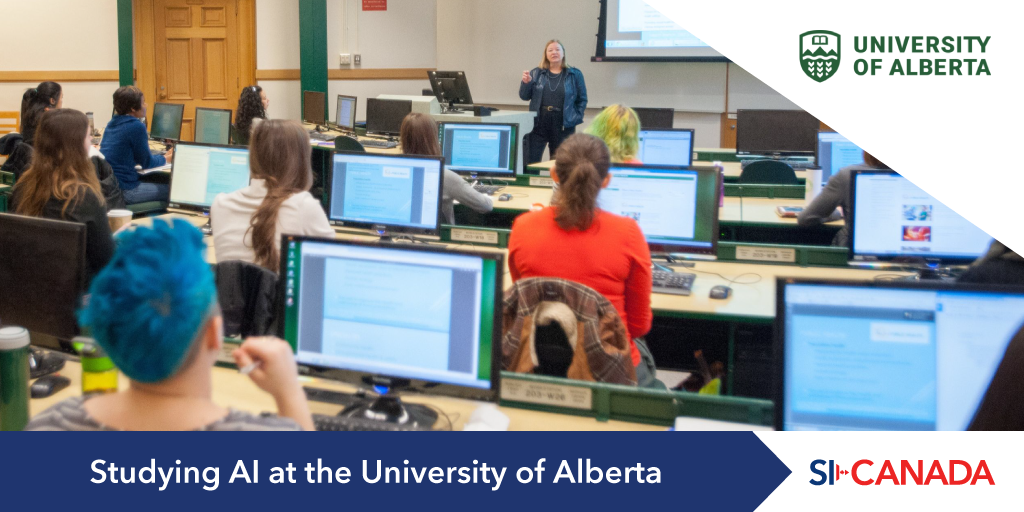The University of Alberta is at the forefront of innovation and excellence in Artificial Intelligence (AI), offering exceptional programs that equip students with the knowledge and skills needed to excel in this rapidly evolving field. As a global AI research and development leader, the university has a rich ecosystem of renowned faculty members, innovative research facilities, and industry partnerships with Alberta Machine Intelligence Institute, AltaML, and DeepMind.
Students at the University of Alberta can take undergraduate AI and machine learning programs if they are starting their educational journey. Additionally, students already possessing a degree in the field can opt for graduate courses to enhance their knowledge base. The university has several research institutes and labs dedicated to advancing AI research and innovation, so students can find numerous opportunities to participate in groundbreaking research projects that push the boundaries of AI knowledge and applications.
The University of Alberta offers AI subjects through the Faculty of Science, and most students explore specific courses in the Computing Science department. The university's approach to imparting high-quality education is such that the Faculty of Science offers several AI-related subjects in separate courses. Learn more about AI programs at Alberta below, and to begin your application, contact SI-Canada today.

Top AI Courses at the University of Alberta
1. Computer & Games
One of the main undergraduate courses offered by the Computing Science department at the University of Alberta is the CMPUT 250 - Computers and Games.
This course focuses on studying and creating computer games as an interactive entertainment option and how these impact society. The curriculum involves a creative process wherein students come up in teams with a concept and create a short narrative-based game using a commercial game engine. This project helps meet various course objectives, including gaining hands-on experience and learning about new AI technologies to develop computer games. Instructors from several departments come together to teach students and the university.
2. Introduction to Robotics & Mechatronics
The application of robotics has increased to the extent that they now have a presence in industries, homes, medical fields, and space. This increased prevalence of robotics in everyday life led to the formulation of the course CMPUT 312-Introduction to Robotics & Mechatronics at the University of Alberta.
The course allows students to learn the foundations of developing intelligent robots that perform various functions. They are given lessons on how to write algorithms for robot movement, which starts with mathematically modelling robot geometry. Right from creating the mechanical and electrical parts of robots to how their sensors work, students are given precise assignments and projects to enhance their knowledge and real-world applications.
3. Advanced Game Programming
Undergraduate students interested in learning AI and graphics programming for video games can opt for the CMPUT 350- Advanced Game Programming course.
The major focus is on translating programming languages such as C++ into interactive and artistic storytelling that can be implemented in creating video games. Students are taught to build smarter AI systems and GUIs that can be used in the gaming industry through assignments, lab exams, and projects. In the AI section of the courses, students learn efficient pathfinding algorithms, planning, and scripting AI systems for games. The learnings are enhanced by allowing students to cover lessons on graphics that they can use in their careers as game developers.
4. Intelligent Systems
One of the courses that helps students master the foundations of AI at the University of Alberta is the CMPUT 366- Intelligent Systems.
It is provided as a specific course that enables students to build intelligent software for application in the technology industry. The topics in this course include reasoning and acting under uncertainty, knowledge representation, machine learning, neural networks, search, and problem-solving techniques. Students are taught to let them understand the foundations of modern probabilistic AI so that they can take up advanced courses in the field. The methods of knowledge dissemination include assignments, lab work, and projects, enabling students to learn through hands-on experience.
5. Introduction to Machine Learning
The CMPUT 466- Introduction to Machine Learning course covers the foundational learning methods and includes modules on adaptive control, diagnosis, forecasting, recognition, and data mining. Students are provided with specific learning on classical regression and classification algorithms. More advanced modelling techniques are also included to enhance students' learning experience. They learn how to formalize problems and derive learning algorithms through assignments and projects.
6. Introduction to Natural Language Processing
One of the essential courses that students can take up in their undergraduate studies is the CMPUT 461/501- Introduction to Natural Language Processing.
This course allows students to learn the various elements of NLP, a subfield of AI. Through this special course, they understand how to create better interactions between computers and human languages, as the emphasis is on writing programs that can process text. After completing this course, students become familiar with the basic NLP concepts and tools that they can use to implement programs that apply them to texts.
Entry requirements
Many of the courses discussed above are part of the undergraduate programs within the Faculty of Science at the University of Alberta. The general entry requirement to study these courses is that the applicants must have completed their high school with courses in computer science and relevant fields. Additionally, international students must also showcase proficiency in the English language through test scores from standardized exams. Some other requirements may include an interview as well.
International Fees
AI programs at the University of Alberta can be taken as individual courses, all contributing to earning a Bachelor's or Master's in Science. As these courses can be taken to count towards credits for the final degree, the university adds the tuition fees as per the courses chosen by students. The tuition fees for these courses can range from CAD 2,000-5,000 per term.
Study AI at the University of Alberta
Are you interested in studying AI at the University of Alberta? If so, consider booking a free consultation with SI-Canada today.












